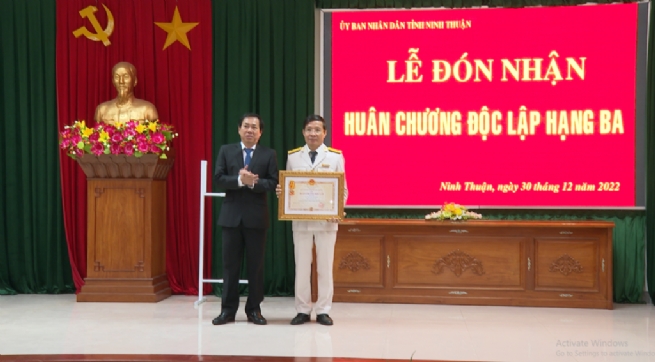The Ninh Thuan Tax Department has made practical contributions to the development of the province. The department has been recognized by all levels and local sectors as one of pioneers in administrative procedure reform and business facilitation. Our reporter has an interview with Mr. Nguyen Van Dung, Director of the Ninh Thuan Tax Department, on these issues.

The Tax Department is honored with the Third-Class Independence Order in recognition of its commendable service
Could you please tell us about State budget revenue of the province in the first nine months of 2023?
In the first nine months of 2023, total (domestic) budget revenue was VND2,716 billion (equal to 77.9% of the target assigned by the Provincial People's Council, but just 92.5% of the same period of 2022).
Although the value exceeded the target (over 75%), it decreased from the same period of 2022. Budget revenue from basic construction of wind and solar power projects sank because these projects completed construction and started operating but must await the electricity price mechanism and tax incentives. Thus, no tax has arisen from these projects to offset the decline caused by tax and land rent exemption, reduction and extension policies of the National Assembly and the Government in support of businesses and people.
In addition to achievements, did the sector experience mixed difficulties?
In the first nine months of 2023, the COVID-19 epidemic still exerted a negative impact on the economy and affected people and businesses. On the other hand, global and domestic economic slowdown, rising oil prices, growing exchange rates, high interest rates, disrupted supply chains and sluggish real estate market caused companies to face financial difficulties and weaken their tax obligations to the State Budget.
But, with its active approach and ongoing innovation to promptly grasp new opportunities, the Ninh Thuan Tax Department always monitors and grasps market developments, business performances of enterprises and people, and budget collection and payment; and reviews and firmly grasps the tax amount that affects the increase/decrease in budgetary revenue and the amount of tax payment extended for each subject, industry and field for active tax management. Especially, the department accelerates the uncompleted revenue collection to ensure the fulfilment of full-year tax target set for 2023. The agency focuses on tapping tax sources that have room for growth (such as doing business on digital platforms, e-commerce and real estate transfer).
In addition, the tax sector actively advises the Provincial People's Committee to issue a directive on strengthening budget revenue management measures as a basis to direct local branches and levels to closely coordinate with tax authorities in budget revenue management to prevent loss.
At the same time, the department will continue to boost communications and support for new tax policies in 2023; focus on dialogues and solve difficulties faced by businesses and people; closely follow directions of the Government, the Ministry of Finance and the General Department of Taxation in reviewing applications for tax and land rent exemption, reduction and deferral to launch effective support packages.
How has the tax sector paid attention to administrative procedure reform?
Administrative reform, with a focus on administrative procedure reform, has been materialized by specific practical tasks. The department has directed its subordinate agencies to speed up information technology application, introduce initiatives to reduce the workload and shorten the time of settling administrative procedures; and announces the telephone hotline to receive feedback and recommendations at single-window units of tax authorities at all levels and on the department's website.
To date, tax agencies have reduced administrative procedures, from 304 to 235 (145 administrative procedures of Level 3 and Level 4, with 101 administrative procedures integrated into the National Public Service Portal; 90 administrative procedures of Level 2, with 48 administrative procedures eligible for upgrading to Level 3 and Level 4). The tax sector promotes first-time tax registration procedures and personal tax registration information changes on the National Public Service Portal; electronic tax payment for individuals/business households (via National Public Service Portal, eTax Mobile application and commercial banks’ applications); and maintain good coordination regulations under the single-window units at tax agencies at all levels to receive and resolve administrative procedures.
What message do you have to send to businesses and investors? How is the local tax sector committed to accompanying and supporting them?
Furthermore, the sector has also actively coordinated with relevant agencies in administering tax affairs, handling tax registration procedures, determining investment incentives and determining land financial obligations for businesses and investors to invest in the province.
Over the past time, the sector has always strived to closely follow the direction of the Provincial People's Committee in improving the business climate and enhancing the Provincial Competitiveness Index (PCI). The sector has also firmly directed agencies to implement tax management measures, strengthen discipline in the performance of public duties of tax officers and not caused troubles in performing official duties. This was reflected by the province's PCI performance in 2022, which increased 19 places from 2021 to rank 30th out of 63 provinces and cities and stand among the group of 30 provinces and cities with the best economic administration.
In the coming time, the Ninh Thuan Tax Department is committed to accompanying and supporting businesses and investors with the message of "accompanying and supporting businesses and investors to settle tax administrative procedures and handle tax issues in project investment and operation.
Thank you very much!
Source: Vietnam Business Forum